What Least Resistance
Training Is
Part Eight -
Additional Comments by Willis Lamm
|
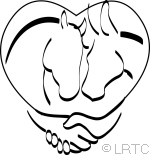
| |
|
(Willis is Founder and President of Least Resistance Training Concepts.)
|
|
After years of working with literally hundreds of wild horses and wild horse adopters, we've seen some pretty consistent trends that one can pretty much take to the bank. How much a person knows is not nearly as important as a person's attitude and willingness to seek out approaches that truly benefit the horse.
When considering what does and doesn't work with respect to gentling wild horses there are a few situations that immediately come to mind.
|

|
|
Ego
Ego is the greatest inhibitor of effective horse training that there is. To make the training process easy we first have to leave our egos at the gate. The horse doesn't care how important we are or how important we think we are. He only cares about how we act and the less obnoxious we are the more likely he will be to engage and learn.
|

|
|
Confidence
It's hard to get the horse to be confident if we aren't. If we're not sure about what it is that we are doing, then we need to do some research, distill what makes sense from all the information out there, and develop some kind of game plan in which we are reasonably confident.
|
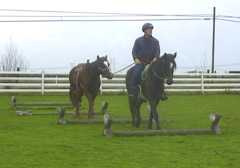
|
|
Flexibility
While we should have some idea as to our objectives for each training session, we need to have enough sense to adapt if the horse shows us that his needs involve something else. The horse is not a mechanical object and we need to take our cues from him, just as we expect him to learn to take his cues from us.
|
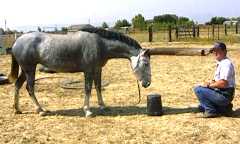
|
|
Empathy
Effective gentling and training of wild or abused horses is a symbiotic relationship. Both the horse and the human depend on each other for the horse to comfortably adapt to living in the human environment. The handler could repeatedly bark orders to the horse until the animal establishes some form of rote behavioral response. The effective handler, however, also looks at the situation from the horse's point of view and although still in charge, adapts the training regimen to the needs of the horse; making wrong responses difficult but making right responses easy for the horse.
|
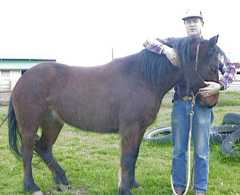
|
|
Social Support
Horses are social animals and for the most part they rely on social support from other members of their band for their emotional safety and well being. Activities such as caring grooming, either between horses or between handler and horse, provide a great deal of emotional support and in many instances can be soothing and calming to the animal. Once the animal recognizes grooming by humans as a positive social experience, you can't do enough of it.
|

|
|
Time
In most instances the horse spends nearly all of his time away from direct human contact. Even daily activities with the horse usually comprise less than 1/10 of his day. All training should begin and end on a positive note. More frequent short sessions often are more productive than occasional marathon sessions. When time is limited the emphasis should be on keeping the horse relaxed and curious, and working on simple, basic elements that the horse can master in a short interval. If your time is up before you accomplish your objective, go back to something that the horse can do well and end the session on something positive.
|
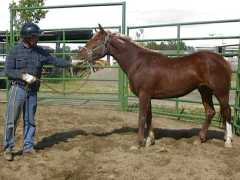
|
|
(This feature is still being completed)
|

|
Check Out These Other Mentor Links
Album of Wild Horse Workshops
This is not a BLM operated or BLM sponsored site. It is run by private wild horse and burro enthusiasts.

Press Back to return to the page which brought you here
Email us to submit
comments or request reproduction permission.
|









